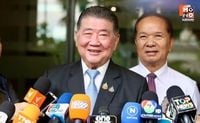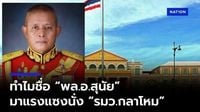On June 22, 2025, Thailand’s political landscape saw significant shifts as Prime Minister Paetongtarn Shinawatra convened a crucial meeting with coalition party leaders at Bangkok’s Rosewood Hotel to discuss a comprehensive cabinet reshuffle. This meeting came on the heels of the Bhumjaithai Party’s dramatic exit from the coalition, vacating eight ministerial seats and prompting a reallocation of cabinet quotas among the remaining parties.
The reshuffle is not just a routine political maneuver but a strategic recalibration amid rising regional tensions, particularly along the Thailand-Cambodia border. The government aims to strengthen its stance by placing experienced military figures in key defense and interior positions, signaling a more assertive posture in handling security challenges.
At the heart of the reshuffle is the anticipated replacement of Bhumitham Wechayachai, the current Deputy Prime Minister and Interior Minister, popularly known as “Big Oan.” According to multiple sources, Bhumitham is expected to transition from his civilian defense role to become the Interior Minister, a move that aligns with internal party support and strategic needs. This shift opens the Defense Ministry seat, which is likely to be filled by a prominent military figure.
Two leading candidates have emerged to take the helm of the Ministry of Defense. The first is General Natthapol Nakpanich, nicknamed “Big Lek,” who currently serves as Deputy Defense Minister and Director of the Thai-Cambodian Border Affairs Center. Natthapol’s background is impressive: a graduate of the prestigious Military Preparatory School Class 20, he has held key military positions including Director-General of the Army’s Strategic Department and Secretary-General of the National Security Council under the previous government. He also gained national recognition as the “COVID fighter” for his leadership at the COVID-19 management center during the pandemic.
The second contender is General Sunai Praphuchanai, a former assistant army chief and commander of the elite Special Warfare Unit. Known for his quiet but decisive leadership style, Sunai is a graduate of Military Preparatory School Class 21 and has cultivated strong ties with the Pheu Thai Party. His political ambitions were demonstrated recently when he ran for the Governor of Lopburi Provincial Administrative Organization, backed by Pheu Thai, although he did not win. This experience has given him a nuanced understanding of political dynamics and grassroots concerns.
Sunai’s military credentials and political savvy make him a fitting choice to navigate the increasingly tense border situation with Cambodia, where the potential for armed conflict has grown. His close age and rank proximity to current military leaders, including the Royal Thai Army Commander-in-Chief General Thongwit Hunpakdi (“Big Aod,” Class 24), further bolster his suitability for the Defense Ministry.
Adding complexity to the reshuffle is the possible involvement of General Chaloempol Srisawat, former Commander-in-Chief of the Royal Thai Armed Forces and a Class 21 peer of General Sunai. However, Chaloempol is currently subject to a political ban that will not lift until 2026, limiting his immediate prospects.
Meanwhile, the Interior Ministry is poised for a significant upgrade with Natthapol Nakpanich as a leading candidate. His current role directly managing border affairs places him at the nexus of security and political strategy, making him a logical fit to replace Bhumitham. Another name linked to the Interior Ministry is Serimsak Pongpanich, expected to become Deputy Interior Minister.
The reshuffle also touches other key ministries. Prasert Chanthararuangthong, currently Minister of Digital Economy and Society (DES), is anticipated to move to the Ministry of Labor. In his place at DES, Jakkrapong Saengmanee, a former minister attached to the Prime Minister’s Office, is the favored successor.
In the agricultural sector, Arttakorn Sirilatthayakorn is slated to take over as Minister of Agriculture and Cooperatives from Naruemon Pinyosinwat, who will shift to the Ministry of Higher Education, Science, Research, and Innovation. This realignment reflects efforts to optimize expertise across ministries.
The Democrat Party appears to be gaining ground in this reshuffle. Dech-ism Khaothong, currently Deputy Public Health Minister, is expected to move to Deputy Interior Minister. Additionally, the party is poised to secure an extra ministerial post, with Chaichana Dechdecho, Deputy Party Leader and MP for Nakhon Si Thammarat, likely to become Deputy Public Health Minister. Chaloemchai Sri-on is predicted to retain his role as Minister of Transport.
Jatuphorn Burutphat, the Permanent Secretary of the Ministry of Natural Resources and Environment, is expected to ascend to the roles of Deputy Prime Minister and Minister of Commerce. Despite these changes, the Ruam Thai Sang Chart Party’s ministerial quotas are expected to remain stable.
Prime Minister Paetongtarn’s approach to this reshuffle underscores a delicate balancing act: consolidating power within the coalition after the Bhumjaithai Party’s departure, integrating military leadership into civilian government roles, and preparing the nation to face geopolitical challenges head-on. The presence of military figures like Natthapol and Sunai in key ministries signals a government ready to project strength and unity.
As the coalition parties submit their candidate lists for vetting on June 23, the political atmosphere remains charged with anticipation. The reshuffle is more than a mere cabinet update; it is a strategic realignment poised to shape Thailand’s governance and security policy for the foreseeable future.
With the stakes high and the political chessboard rearranged, all eyes will be on how these appointments translate into action, especially concerning the simmering border tensions and the country’s internal political cohesion.


